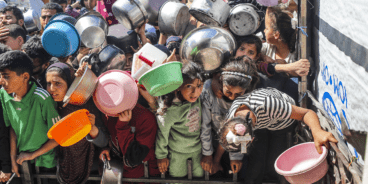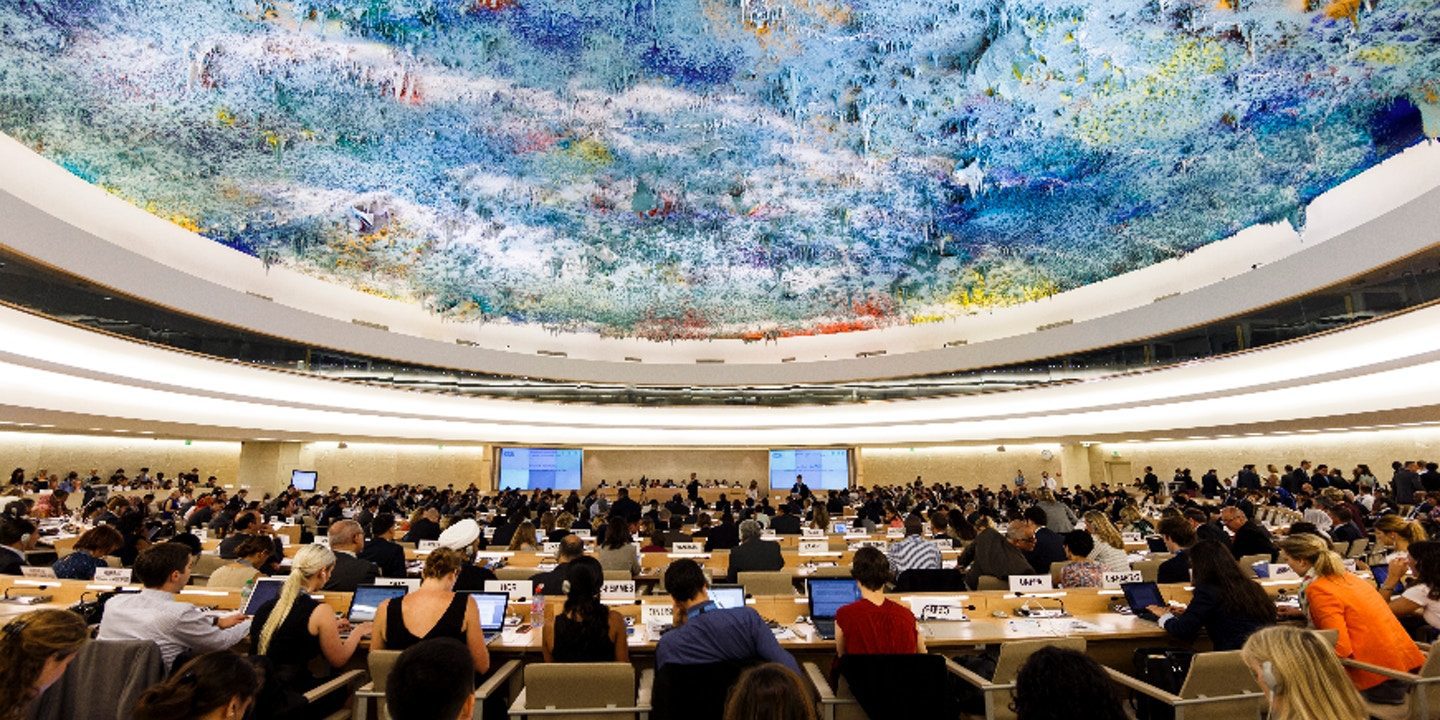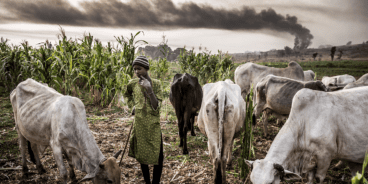

Letter to HRC members on atrocity prevention priorities at the Council’s 51st session
Your Excellency,
On behalf of the Global Centre for the Responsibility to Protect, I am writing to you regarding the 51st Session of the UN Human Rights Council (HRC) in Geneva.
The HRC plays an essential role in the prevention of mass atrocity crimes by responding to situations where populations are at risk of, or are experiencing, genocide, war crimes, crimes against humanity or ethnic cleansing. During its 44th session in July 2020 the HRC adopted a thematic resolution on the Responsibility to Protect (Resolution 44/14), recognizing the important contribution of the UN human rights system in addressing situations where there is a risk of atrocity crimes being committed. This is in line with the Council’s prevention mandate, enshrined in General Assembly Resolution 60/251, which stipulates that it shall “contribute, through dialogue and cooperation, towards the prevention of human rights violations and respond promptly to human rights emergencies.”
As a current member of the HRC we strongly urge you to uphold this shared commitment to prevent atrocity crimes. The Global Centre respectfully encourages you to consider the following recommendations as you engage in the 51st regular session:
Afghanistan
Since the Taliban took over Afghanistan on 15 August 2021, they have committed serious human rights abuses targeting vulnerable populations, including religious minorities and women and girls. The Taliban de facto authorities have reportedly perpetrated extrajudicial killings, arbitrary detentions, beatings and threats against previous Afghan government officials, political opponents, journalists, civil society activists and human rights defenders. These violations are coupled with severe restrictions on fundamental rights, including freedom of religion, as well as access to civic and public space. The Taliban de facto authorities have institutionalized large scale and systematic gender-based discrimination and violence against women and girls, including forced marriage and restrictions on freedom of movement and expression, employment opportunities and access to education and healthcare. In addition, over 2,35o civilians have been killed or wounded since 15 August 2021, primarily due to targeted attacks perpetrated by the so-called Islamic State in Iraq and the Levant-Khorasan (ISIL-K). Attacks by ISIL-K have primarily targeted ethnic and religious minority communities, in particular Hazara Shi’as, Shi’a Muslims and Sufi Muslims.
During an urgent debate held on 1 July 2022, the HRC adopted Resolution 50/14 which called on the Taliban to reverse policies and practices that restrict the fundamental rights and freedoms of Afghan women and girls and called for an Enhanced Interactive Dialogue during the 51st session. The Global Centre respectfully urges you to highlight the elevated atrocity risks facing populations in Afghanistan during the Interactive Dialogue. The Global Centre also urges you to adopt a resolution that strengthens the mandate of the Special Rapporteur on the situation of human rights in Afghanistan to include the collection of evidence of violations and abuses of international law.
Burundi
According to the UN Commission of Inquiry (CoI) on Burundi, authorities in the country have committed possible crimes against humanity since at least April 2015. At the time of their mandate’s termination in September 2020, structural risk factors for atrocity crimes remained in place, including arbitrary arrests of actual or alleged opponents, torture, enforced disappearances, sexual and gender-based violence and extrajudicial executions.
During the upcoming session, the Special Rapporteur on Burundi, Mr. Fortuné Gaetan Zongo, will provide critical monitoring and reporting on ongoing serious human rights violations and abuses in Burundi, as well as recommendations to the government and wider international community on how to prevent the recurrence of atrocity crimes. As national and international human rights organizations are still unable to operate in Burundi, and serious human rights violations and abuses continue, ongoing public reporting by the Special Rapporteur is essential to ensure international scrutiny on the risk of recurring atrocity crimes. The Global Centre therefore respectfully encourages you to adopt a resolution to extend the mandate of the Special Rapporteur in full. The resolution should also reiterate that the primary responsibility to protect its population from crimes against humanity lies with the government of Burundi. This is in line with a Joint CSO call released on 18 August.
Central African Republic
For nearly two years an alliance of predatory armed groups, known as the Coalition des patriotes pour le changement (CPC), have perpetrated violence and atrocities in the Central African Republic (CAR). According to the Office of the UN High Commissioner for Human Rights (OHCHR), two CPC-affiliated armed groups have perpetrated systematic and widespread conflict-related sexual violence. Since the CPC launched their offensive against the government, the Central African Armed Forces (FACA) – working closely with Russian security partners, including mercenary fighters from a private security company, the Wagner Group – have responded with counter-offensives and committed widespread violations of International Humanitarian Law. The UN Independent Expert on the human rights situation in CAR, Yao Agbetse, reported this year that these forces have systematically prevented UN investigators from accessing sites of various alleged crimes. These forces have also increasingly perpetrated targeted attacks against ethnic and religious minority communities, particularly Muslim and Fulani populations. In March then UN High Commissioner for Human Rights, Michelle Bachelet, warned that the pattern of violations against minority communities risks triggering a new cycle of violence along communal, religious and ethnic lines.
A climate of impunity has enabled ongoing violence and allegations of serious human rights violations and abuses. In this regard, the Independent Expert, who works closely with the UN peacekeeping mission in CAR, the Special Criminal Court and other UN bodies, is essential for supporting accountability and transitional justice mechanisms to help prevent further atrocities. The Global Centre respectfully encourages you to adopt a resolution to renew the mandate of the Independent Expert and to support the inclusion of R2P language in the resolution by “recalling that the authorities of the Central African Republic have the primary responsibility to protect all populations from genocide, war crimes, ethnic cleansing and crimes against humanity.” We also respectfully encourage you to call on the Independent Expert to conduct risk assessments on structural risk factors for atrocity crimes, particularly the lack of accountability and the propagation of hate speech and provide regular public reporting on his findings.
China
Under the guise of combatting religious extremism, the Chinese government has persecuted Uyghurs and other majority-Muslim ethnic groups in the Xinjiang Uyghur Autonomous Region (XUAR). Over 1 million people, mainly Uyghurs, have been arbitrarily detained since 2017. In her report from 31 August, then High Commissioner Bachelet determined that the extent of arbitrary and discriminatory detention of Uyghur and other majority Muslim-ethnic groups may constitute crimes against humanity, and that conditions remain in place for serious violations to continue. The report requested urgent attention by the UN system.
The report’s findings are in line with previous calls by UN Special Procedures, including the Special Rapporteurs on the promotion and protection of human rights and fundamental freedoms and on contemporary forms of slavery. In addition to forced labor, the Chinese government is also perpetrating possible genocide against Uyghurs, including through a coercive campaign meant to reduce the birth rate through forced abortions and sterilizations. In June 42 UN experts expressed concern about China’s human rights abuses in XUAR and urged the HRC to respond with more substantial action.
The public release of the High Commissioner’s report is an important way to hold the Chinese government accountable for ongoing possible atrocity crimes, but it must result in formal discussions by UN member states on its findings and recommendations to determine necessary action. The Global Centre therefore respectfully urges you to adopt a resolution to mandate an investigative and accountability mechanism. Within the resolution you should also request a formal debate at the 52nd session of the HRC in March 2023 on the High Commissioner’s report. This would provide an opportune forum to discuss which steps the international community should take to prevent further possible crimes against humanity and hold perpetrators to account.
Democratic Republic of the Congo
Recurrent attacks by armed groups have threatened populations in the eastern provinces of the Democratic Republic of the Congo (DRC) for nearly 30 years. More than 120 militias and armed groups are active in eastern DRC, despite government and regional efforts to confront them. Some armed groups, including the Allied Democratic Forces, the Cooperative for the Development of Congo and the March 23 Movement, may be responsible for war crimes and crimes against humanity. According to the UN Joint Human Rights Office in the DRC, during 2021 at least 2,024 civilians were killed by armed groups in North Kivu, South Kivu, Tanganyika and Ituri provinces. During military operations, some members of the government’s armed forces have been implicated in violations and abuses, some of which may amount to war crimes and crimes against humanity. Recurring inter-communal violence also continues to pose a grave human rights and protection threat. The UN High Commissioner for Human Rights and Special Adviser on the Prevention of Genocide warned in June that hate speech and incitement to hostilities has been spread at alarming levels, with the risk of widespread violence, including atrocity crimes targeting specific populations.
HRC Resolution 48/20 extended the mandate of the International Team of Experts on the DRC to cover the entire national territory of the DRC, beyond the Kasaï region. The Global Centre respectfully encourages you to renew its mandate for a period of one year, requesting that the Team provide technical assistance to national authorities to combat impunity and recommendations to the HRC on necessary action to ensure accountability and prevent the recurrence of atrocity crimes. We also encourage you to call upon the Team to regularly report on ongoing violations and abuses in the conflict-affected provinces of the eastern DRC, including possible atrocity crimes, and to conduct risk assessments on early warning signs of atrocity crimes ahead of the 2023 elections.
Ethiopia
Since November 2020 civilians in northern Ethiopia have endured possible war crimes, crimes against humanity and ethnic cleansing amidst fighting between the Ethiopian federal forces and their allies and forces loyal to the Tigrayan People’s Liberation Front. Thousands of civilians have been killed while millions remain displaced and in need of urgent humanitarian assistance in the Tigray, Amhara and Afar regions. There have been reports of serious violations and abuses of international law, including indiscriminate attacks on civilians and civilian infrastructure, unlawful killings, rape and sexual violence ethnic-based killings, forced displacement and the destruction of cultural and religious heritage sites.
In December 2021 the HRC created a mandate for the International Commission of Human Right Experts on Ethiopia (ICHREE) to investigate allegations of violations of international law during the conflict. Since beginning its investigations, ICHREE has been unable to undertake on-site visits to the conflict zone or access refugees in Sudan and remains underfunded and understaffed. The Global Centre respectfully encourages you to adopt and support a resolution to renew ICHREE’s mandate in full. This appeal echoes a joint NGO call released on 2 September. We also encourage you to ensure that the resolution stresses that “the government of Ethiopia has the primary responsibility to protect its population from war crimes and crimes against humanity.”
Somalia
Despite the 2012 formation of the Federal Government of Somalia, populations remain at risk of atrocity crimes amidst ongoing conflict and attacks perpetrated by armed extremist groups, particularly Al-Shabaab, and the forces combatting them. According to the UN Secretary-General’s report from February 2022, an average of 265 security incidents were recorded in Somalia per month in 2021, with the majority perpetrated by Al-Shabaab.
The Federal Government of Somalia currently lacks the capacity to adequately protect civilians from the predations of various armed groups. Historically large-scale military offensives by government forces, partnered with the former African Union Mission in Somalia – now the AU Transitional Mission to Somalia – have posed a threat to vulnerable populations. The Independent Expert on the situation of human rights in Somalia plays a crucial role in assisting the Federal Government in addressing these challenges. The Global Centre therefore respectfully encourages you to renew the mandate of the Independent Expert and support the inclusion of R2P language in the resolution by recalling that “the Federal Government of Somalia bears the primary responsibility to protect civilians from war crimes and crimes against humanity.”
Venezuela
Since at least 2014, Venezuelan security and intelligence forces have perpetrated arbitrary detention, short-term enforced disappearances, torture and ill-treatment and sexual and gender-based violence in a context of pervasive impunity. In 2020 the HRC-mandated Fact-Finding Mission (FFM) on Venezuela warned that patterns of violations and abuses were authorized at the highest level of government and committed as part of a “widespread and systematic attack” against the civilian population that may amount to crimes against humanity. In 2021 the FFM highlighted that Venezuela’s judicial system plays a role in facilitating ongoing systematic persecution. While the government has undertaken steps to minimize international scrutiny, authorities have simultaneously increased systematic harassment and persecution of civil society, independent media and human rights and humanitarian actors. Despite being a current member of the HRC, the government also refuses to cooperate or grant access to the FFM.
The FFM remains the only international monitoring body with the mandate to investigate alleged atrocity crimes in Venezuela and provide recommendations to ensure justice for victims. Ahead of scheduled elections in 2024 and 2025, the FFM can also fulfill a crucial early warning and risk assessment role, including through analyzing the structural conditions that facilitate systematic human rights violations and abuses, and providing recommendations to mitigate the risks of further deterioration. The Global Centre therefore respectfully urges you to adopt a resolution to renew the mandate of the FFM in full for a period of two years. The resolution should also renew the existing reporting mandate of OHCHR established in Resolution 42/25 and 45/20. This is in line with a joint CSO call, and detailed Q&A document, released on 17 August.
Yemen
Since March 2015 all parties to the conflict in Yemen have perpetrated violations and abuses of international law that may amount to war crimes, including indiscriminate airstrikes and shelling, torture, arbitrary detention and sexual and gender-based violence. More than 19,200 civilians have been killed or maimed as a result of airstrikes by the Saudi Arabia and United Arab Emirates-led international coalition alone, including over 2,300 children. During October 2021 the HRC abruptly terminated the mandate of the Group of Eminent Experts (GEE). Hostilities dramatically escalated as missiles and airstrikes targeted and destroyed civilian objects and critical infrastructure, including water reservoirs, hospitals and telecommunications towers, across multiple governorates. Over 1,100 civilians were killed or maimed between January and the end of March alone before a negotiated truce was reached on 2 April.
Though the fragile truce in Yemen is currently holding, it does not sufficiently address widespread violations and abuses of international law or accountability for previous atrocities. The termination of the GEE entrenched impunity and emboldened all parties to the conflict to continue to commit possible war crimes and other serious violations. The Global Centre therefore respectfully urges you to work towards establishing a new international independent accountability mechanism for the situation in Yemen, mandated to collect and preserve evidence of violations of international law, prepare files for criminal proceedings in accordance with international legal standards, and identify victims and document harms for possible future reparation claims. This is in line with a joint CSO call released on 6 September.
Interactive Dialogues on country-situations at risk of, or experiencing, atrocity crimes
During its 51st session, the HRC will have an opportunity to discuss numerous other atrocity situations. We respectfully urge your delegation to actively participate in the interactive dialogues with the Independent Investigative Mechanism and the Special Rapporteur on Myanmar, the CoI on the Syrian Arab Republic and the CoI on Ukraine, as well as during the Interactive Dialogue on the High Commissioner’s oral update on technical assistance and capacity building for South Sudan. During the General Debate under Item 4, we respectfully urge your delegation to note that possible atrocity crimes are also currently being committed in the Central Sahel, Israel and the Occupied Palestinian Territory, Mozambique, Nigeria and Sudan, and that the international community must do more to uphold its collective responsibility to protect.
Related Content


Atrocity Alert No. 445: Sudan, Syria and Eritrea
